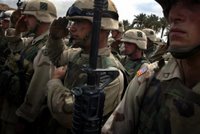
In less than two weeks, the territory of Puerto Rico will decide on a ballot issue that determines their future. On the ballot, there are two choices:
1. Should Puerto Rico stay as a commonwealth of the United States (its current status)?
2. a. Should Puerto Rico become an American state (something which hasn't happened in over fifty years - adding a new state to the Union);
b. should Puerto Rico become an independent nation and break political ties with the U.S.; c. or should PR become a free nation with an association with the U.S.?
An argument for independence points to the fact that Puerto Rico is a Latin American nation and that it is culturally, linguistically, and socially different than the U.S. An advocate for independence stated the following:
"There's no reason for the United States to try to incorporate a Latin American country," he said. "If they want a country, why not Jamaica? They speak English there. It doesn't make sense." 5
Puerto Rico would become the poorest state in the nation, with a GDP of $16,000 and an unemployment rate of 13.7%. Mississippi is currently the poorest state in the nation with a GDP of $21,000, and Nevada's unemployment is the worst w/ 11.8%. 3 4 By becoming a state, Puerto Ricans would be required to pay federal income taxes, even though the territory currently receives $4 billion in federal aid. 3 If Puerto Rico decides against statehood, they'd still receive federal aid. Nearly half the island's 3.7 million inhabitants live below the poverty line, but the island is still currently big on tourism. 5
An advocate for statehood feels that the island would get more federal aid than it's currently receiving, especially because of the relative poverty:
"People are getting tired here of having to beg for things states automatically get," said Secretary of State Kenneth McClintock. "Many people who support statehood have moved to the States to enjoy the benefits of statehood. Some people are getting impatient." 5Benefits for PR statehood would include gaining three representatives in Congress (a representative and two senators). Plus, though Puerto Ricans have been US citizens since 1917, they cannot vote in presidential elections. 1. The island's residents are allowed to vote in presidential primaries and send delegates to both the Democratic and Republican National Conventions. Puerto Ricans living in the United States, however, can vote in presidential elections.
Senator Obama in 2008 promised to let the Puerto Ricans decide the issue of their statehood and is therefore in support of this referendum. He became the first president to visit the island in 50 years when he went in 2011, since JFK went in 1961. Former governor Mitt Romney has also supported this vote. What statehood would mean for American politics is unclear: Luis Fortuna, the state's governor, is a Republican, and the state tends to be socially conservative but economically liberal. Also, the people of the District of Columbia are looking to become a state as a way of balancing out the statehood issue.
One big thing to remember is that even if a majority of Puerto Ricans vote to become a state on Tuesday, November 6, that does not mean they automatically become a state. Congress would have to approve of their application for statehood, just like it had done with previous states.
Your questions:
1. Should Puerto Rico become a state? Why or why not?
2. Does the U.S. want or need another state? What benefits could Puerto Rico bring with it?
Your answer should be a minimum of 200 words and are due Friday, October 26 by 11:59 p.m.
Sources:
1. http://news.yahoo.com/puerto-rico-statehood-vote-could-election-day-wildcard-100210615.html
2. http://www.bloomberg.com/news/2011-06-14/obama-wants-puerto-rico-to-decide-statehood-or-independence-1-.html
3. http://cornellsun.com/node/52606 Cornell Sun, "Puerto Rico Moving Towards Statehood." 9/13/12.
4. http://www.bls.gov/lau/ Bureau of Labor Statistics.
5. http://www.ibtimes.com/puerto-rico-statehood-bad-business-us-or-next-swing-state-754173 International Business Times, "Puerto Rico Statehood: Bad Business For The U.S. Or The Next Swing State?" 8/23/12.
6. http://www.washingtontimes.com/news/2012/sep/6/new-dc-statehood-plan-strategize-puerto-rico/ The Washington Times. "New D.C. statehood plan: strategize with Puerto Rico?" 9/6/2012.
 During our debate, we pretended that we were back in 1898 after having won the Spanish-American War and taken over colonies from Spain like the Philippine Islands. Option 1 argued that America should keep the Philippines and begin the development of an American empire. Option 2 felt that America needed to walk away from the potential empire that we were about to grab ahold of at that time. Option 3 includes the main idea of keeping the important harbor of Manila in the Philippines only, but not the rest of the archipelago. This is more of a business-centered focus as opposed to military (Option 1) or moral (like Option 2).
During our debate, we pretended that we were back in 1898 after having won the Spanish-American War and taken over colonies from Spain like the Philippine Islands. Option 1 argued that America should keep the Philippines and begin the development of an American empire. Option 2 felt that America needed to walk away from the potential empire that we were about to grab ahold of at that time. Option 3 includes the main idea of keeping the important harbor of Manila in the Philippines only, but not the rest of the archipelago. This is more of a business-centered focus as opposed to military (Option 1) or moral (like Option 2).








